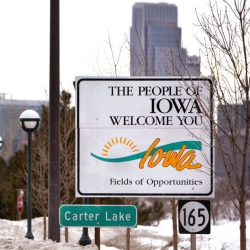
The Carter Lake casino would draw Omaha gamblers, because Nebraska’s largest city is only 7 miles away.
The National Indian Gaming Commission approved a plan by the Ponca Tribe to build a casino in Carter Lake, Iowa. Ponca Tribe Chairman Larry Wright Jr. told reporters he is confident his tribe will build the casino, which will be only 7 miles from Omaha, Nebraska.
This is the second time the Nationa Indian Gaming Commission has approved the plan, which was required due to delays. The Carter Lake casino development has been tied up in a court battle for the better part of a decade.
Attorneys for the interests which sued the Ponca Tribal Authority says they have not decided yet whether to appeal the decision. Neither have officials from Council Bluffs, Iowa, a city whose gaming venue would be affected by a Carter Lake casino.
Iowa and Nebraska Might Appeal Decision
The Iowa and Nebraska attorney generals also have an interest in the casino development, though both say they are reviewing the latest news and gave no other comments. Spokesman Geoff Greenwood of the Iowa Department of Justice said the State of Iowa might appeal the decision.
Having a casino so near Omaha would be a game changer for many Iowa casinos. A consultant prepared a report for the Iowa Racing and Gaming Commission in 2013 which showed 25% of revenues for Iowa casinos come from Nebraska gamblers. A significant portion of those customers come from Omaha and its suburbs, so the Carter Lake casino presumably would absorb a lot of those revenues — perhaps blocking out Iowa rivals.
Carter Lake Casino Gaming Statistics
If the Ponca Tribe’s casino was built, it would contain 2,000 slot machines and 50 table games — which is a considerable casino for a midwestern state. The Carter Lake resort also would have a 150-room hotel. The tribe estimates a casino would create 1,800 permanent jobs, with a commensurate amount of temporary construction jobs.
Larry Wright Jr. suggested the casino would help the Ponca Tribe in countless ways. The 2013 Iowa Gaming Commission report reported that Nebraskans spent $327 million in Iowa casinos. Wright said, “This is an economic engine that will help our tribe move forward and diversify into other areas.”
Ponca Tribe’s Federal Recognition
The Ponca Tribe’s struggle for recognition and licensing has been a long one. In 1962, the Ponca Tribe lost its federal recognition as a sovereign tribe. The Ponca reservation was sold off.
In 1990, the federal recognition was restored. As a result, the Ponca Tribe was able to buy up to 1,500 of land Knox and Boyd counties in Nebraska. This land was placed in federal trust as “restored lands.”
Carter Lake Site
In 1999, the Ponca Tribe bought the 5-acre Carter Lake site in Iowa, then placed it in federal trust. The same land was deeded to the US Bureau of Indian Affairs, which oversees federal recognition and Native American casinos under the 1988 Indian Gaming Act. At the time, the Ponca Tribe said the Iowa land would be used to build a health center.
Eventually, the tribe decided to use the land to build a tribal casino. The National Indian Gaming Commission decided the 2003 promise made by the Ponca Tribe’s lawyers did not prevent the tribe from choosing to build a casino there.
Other Iowa casinos did not see it that way, and filed a lawsuit trying to enforce the 2003 promise. The 1990 federal status deal also was cited, because tribal lands were supposed to be in Nebraska alone. Using those arguments, the plan for the Ponca Tribe casino in Carter Lake has been tied up in federal court for nearly a decade.
National Indian Gaming Commission
The National Indian Gaming Commission is a federal regulatory agency which is part of the U.S. Department of the Interior. The NIGC was created in 1988 in pursuant to the 1988 Indian Gaming Act. It is the only federal agency focused solely on gambling, though other state and local agencies are similar to the Commission. In legal matters, the U.S. Department of Justice represents the NIGC.
The National Indian Gaming Commission consists of a Chair and two Commissioners, who each serve full-time for 3-year terms. It provides oversight to the 472 tribal casinos operating in 28 different US states. Legal counsel, auditors, and divisions of finance, public affairs, and compliance all work under the auspices of the National Indian Gaming Commission. Jonodev Osceola Chaudhuri, a member of the Muskogee (Creek) Nation, is the current chair of the NIGC.
